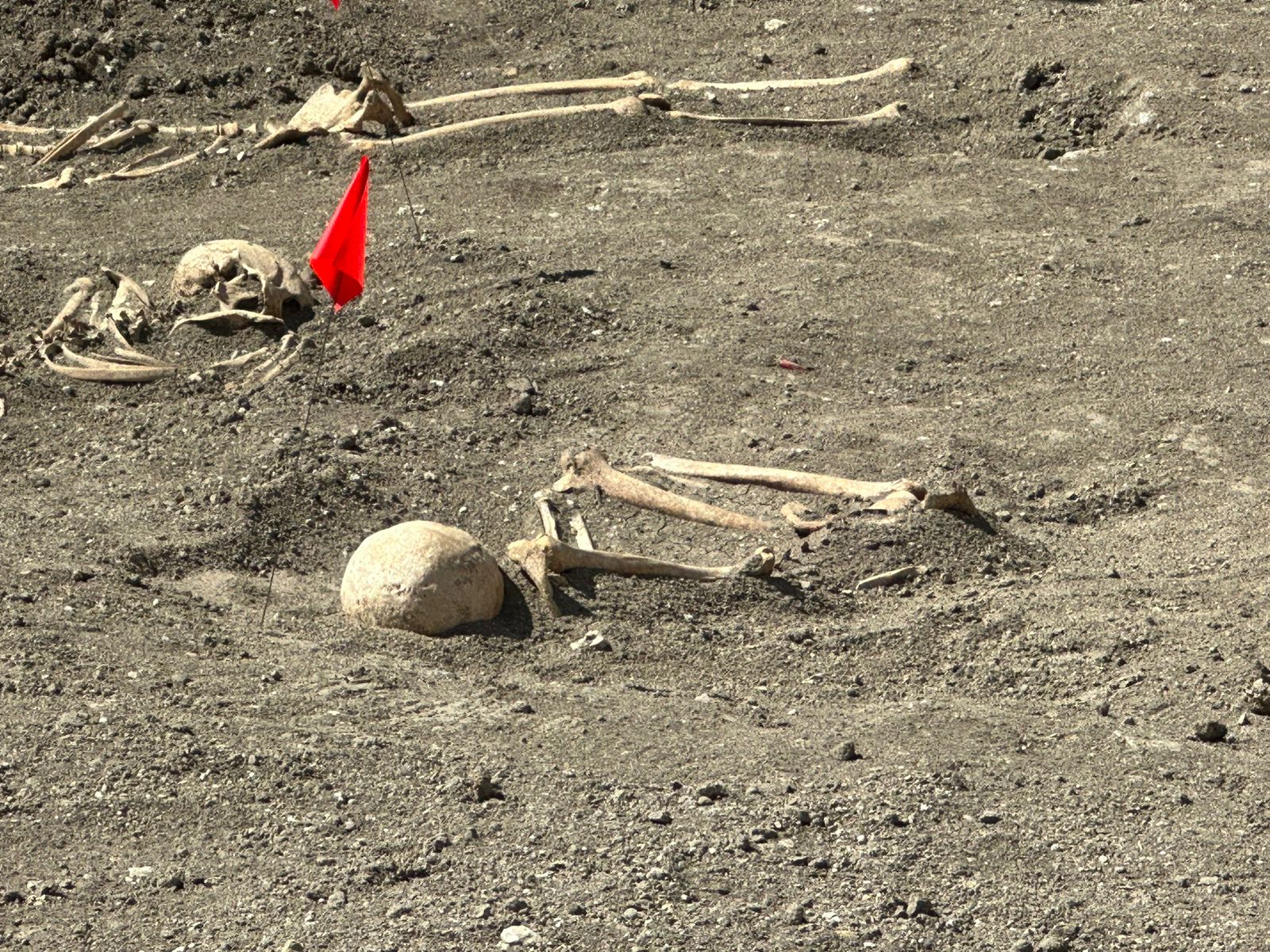Assistant to the President of Azerbaijan, Hikmet Hajiyev, has revealed the discovery of a mass burial site in the town of Shusha in the Karabakh (Garabagh) region of Azerbaijan.
“Another mass grave of 4000 missing Azerbaijanis identified next to Shusha prison where civilians and PoWs kept, treated inhuman way, tortured, killed and buried in mass graves. Armenia to evade responsibilities refuses to provide detailed info about location of mass graves,” Hajiyev, who also serves as the head of the Foreign Policy Affairs Department of the Presidential Administration, wrote on his X page on August 15, while also sharing images of the mass grave.
The bodies of Azerbaijani captives and hostages who died due to torture were disposed of by Armenians in a pit containing sewage water on the grounds of Shusha prison, according to Zaur Ismayilov, a representative of the State Commission on Prisoners of War, Hostages, and Missing Persons. Ismayilov revealed that during excavations carried out between August 1-15, the human remains of 17 individuals were discovered on the premises of Shusha prison.
“Of these skeletal remains, 11 are complete bodies, while 6 consist of various fragments of the human skeleton. The burial site where these remains were found was originally a sewage collection well within the Shusha prison compound. Our captives and hostages who died as a result of torture were indiscriminately thrown into this well in a chaotic and inappropriate manner,” he explained.
Nails discovered amidst the fragments of the six skeletons unearthed in Shusha suggest that the prisoners who were tortured to death were coerced into swallowing them, Ismayilov added. According to him, evidence indicates both gunshot injuries and wounds caused by stabbing and cutting objects.
Emil Tagiyev, who heads the Special Investigation Department of the Azerbaijani Military Prosecutor’s Office, reported that over 480 human remains have been uncovered in the Karabakh region so far.
He further mentioned that approximately 300 forensic-medical and forensic-molecular-genetic examinations were conducted to ascertain the identities of individuals who went missing during the First Karabakh War.
As a result of excavations carried out since May 2023, at least 31 remains have been found in Shusha, Tagiyev added. According to him, these remains are believed to belong to Azerbaijanis who were taken captive and held as hostages during the First Karabakh War.
“Azerbaijanis imprisoned here endured brutal torture, beatings, dog attacks, were fed injured and infirm individuals to pigs, and subsequently buried in this area,” Tagiyev explained.
He also noted that the process of discovering mass graves in Azerbaijan’s liberated territories continues.
Following the dissolution of the Soviet Union in 1991, Armenia launched a full-scale military campaign against Azerbaijan, resulting in the longest and deadliest war in the South Caucasus region. The war ended in a ceasefire in 1994, with Armenia forcibly occupying 20 percent of Azerbaijan’s internationally recognized territories. This occupation led to the deaths of over 30,000 Azerbaijanis and the expulsion of one million others in a brutal ethnic cleansing campaign conducted by Armenia.
Around 4,000 Azerbaijanis went missing during the First Karabakh War. It is widely believed that the vast majority of them were systematically killed and buried in mass graves by Armenian forces.
On September 27, 2020, the conflict between Armenia and Azerbaijan escalated when Armenian forces in the occupied Azerbaijani lands shelled military positions and civilian settlements of Azerbaijan. In a counter-attack that lasted 44 days, Azerbaijani forces liberated over 300 settlements, including the cities of Jabrayil, Fuzuli, Zangilan, Gubadli, and Shusha, effectively ending the nearly 30-year-long illegal Armenian occupation. The war concluded with a tripartite statement signed by Armenia, Azerbaijan, and Russia on November 10, 2020. Under this statement, Armenia also returned the occupied districts of Aghdam, Kalbajar and Lachin to Azerbaijan.
Mass graves have been discovered in various liberated areas of Azerbaijan, including Sarijaly in the Aghdam region, Dashalti in the Shusha region, Edilli in the Khojavand region, Farrukh in the Khojaly region, Yukhari Seyidahmadli in the Fuzuli region, Kalbajar, Aghdam, and other regions and settlements.







 President Ilham Aliyev shed light on the evolving contours of the peace process with Armenia during an international conference in Baku this week. ...
President Ilham Aliyev shed light on the evolving contours of the peace process with Armenia during an international conference in Baku this week. ...
 Azerbaijan and Armenia started the process of demarcation of their border on Tuesday, with the installation of the first border markers based on ge...
Azerbaijan and Armenia started the process of demarcation of their border on Tuesday, with the installation of the first border markers based on ge...
 Iranian President Ebrahim Raisi expressed Tehran’s readiness to participate in significant development projects in Sri Lanka during the inauguratio...
Iranian President Ebrahim Raisi expressed Tehran’s readiness to participate in significant development projects in Sri Lanka during the inauguratio...
 Iran and Pakistan have signed eight cooperation documents in various fields, and agreed to strengthen ties to fight terrorism in the region.
Iran and Pakistan have signed eight cooperation documents in various fields, and agreed to strengthen ties to fight terrorism in the region.
 As the conflict between Ukraine and Russia escalates, the strategic importance of Kharkiv, Ukraine's second-largest city, has come sharply into focus.
As the conflict between Ukraine and Russia escalates, the strategic importance of Kharkiv, Ukraine's second-largest city, has come sharply into focus.



